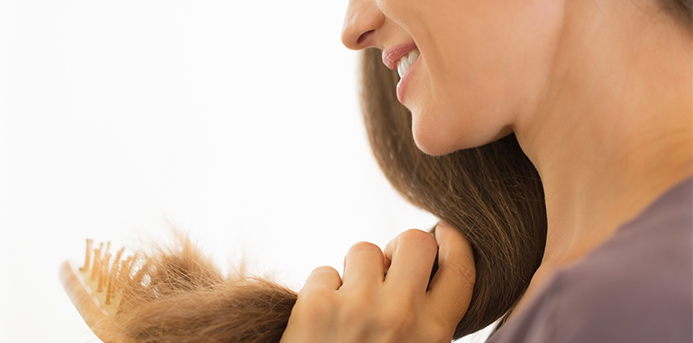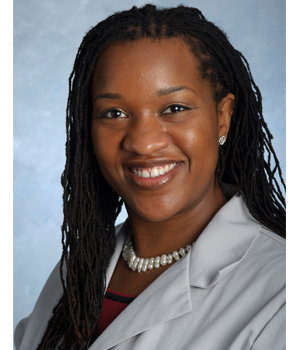Losing some hair is normal. Most of us lose about 100-150 hairs per day. But what if you notice more hair in the drain than usual? What if you see thinning at your scalp? What if your ponytail is hardly worth the effort? Approximately 40 percent of all women will have some type of hair shedding during their lifetime, according to Shani Francis, M.D.
“I was very young when I lost my hair, but old enough to know something was wrong,” says Francis, who lost about 80 percent of her hair after using a bad chemical relaxer. “I felt like less of a girl because I didn’t have hair. People thought I was a boy. I know personally how desperate people feel about hair loss.”
For women, hair is often associated with femininity, beauty, youth and health. Women are often embarrassed when they experience hair loss, which can impact their confidence, social life and even job performance. It is something many women try to hide and may avoid treating.
“I was so upset and spent the summer wearing a hat all the time,” confesses Arlyn Stern, who began losing her hair at age 54. “I was terribly self-conscious and felt like everyone was staring at my head.”
Alopecia is the medical term that refers to hair loss. Alopecia can be scarring or non-scarring. Scarring hair loss is caused by damage to the scalp that destroys the hair follicle and may result in permanent hair loss. Non-scarring hair loss is more common, and is generally reversible. There are many causes for non-scarring hair loss, the most common being genetic.
Hair loss can be caused by:
- Medical conditions
- Certain drugs
- Poor diet
- Hair treatments
- Hormonal changes
- Genetics
Certain medical conditions and prescription drugs can cause hair loss. Talk with your doctor as soon as you notice hair loss to diagnose the problem and potentially reverse the hair loss.
Diet can play a role in hair loss, especially for people with severe restrictions. Vegans and vegetarians often do not consume adequate protein (30-40 grams per day). Low iron and/or vitamin D can also cause shedding. Insufficient calorie consumption, for those trying to lose weight, may also lead to hair loss.
Your hair care regime may contribute to hair loss. Chemical straighteners are generally harmful to the scalp and can contribute to hair loss. Chemical relaxers are very harsh and break the natural bonds that hold the hair together. Coloring is generally not harmful unless it is done too frequently. Extensions and weaves may damage the scalp and cause hair loss. Francis recommends a low-maintenance routine that works with your type of hair. Sometimes a good cut is all you need.
Hormones play a large role in women’s hair loss, especially for those with a genetic predisposition.
“Any shift in hormones, like pregnancy, childbirth, or from birth control pills, can stimulate an episode of shedding,” Francis says. “For these types of episodes you generally won’t go bald, the shedding will stop, and the hair will grow back, but you may lose 40 percent of your hair.”
The most common cause of hair loss is a medical condition called hereditary hair loss. About 80 million men and women in the United States have hereditary hair loss, according to the American Academy of Dermatology.
“It can come from your mother, father or other relatives,” Francis says. “You may not even know someone had hair loss because they camouflaged it well.”
Hair grows in a cycle: growth, transition and rest. Francis says that for some women going through menopause, the hair doesn’t start the cycle over. The good news is that you may be able to stimulate the scalp and trigger regrowth of hair.
“I started noticing when my part was getting wider and wider,” Stern says. “At first, I thought I was imagining it, but the more I saw my scalp, the more I couldn’t deny it.”
Stern started taking vitamins, but they didn’t seem to slow the hair loss. She made an appointment with Francis, which she says changed her life.
“I went in there crying and feeling so much shame,” Stern says.
The only FDA-approved hair loss treatment for women is Minoxidil, which is sold over the counter. Minoxidil comes in a 2 percent solution, and a recently-approved 5 percent foam. Rogaine is a well-known brand that now offers the foam. Francis has seen very good results with Minoxidil. She prefers the foam to the solution. The foam is applied once a day versus the solution, which is applied twice a day. She finds the foam easier to apply and less irritating to the scalp. Insurance does not cover over-the-counter treatments, which cost about $30 for a two-month supply.
Francis prescribed Stern a regimen of vitamins and prescription shampoo, as well as 5 percent Minoxidil for daily use. Stern says the process was slow, but eventually it worked.
“Waiting for hair growth seemed to take forever,” Stern says. “Yet, truly after several months, it seemed like hair just appeared out of nowhere. About six months later, she confirmed there was a significant amount of hair growth, and 10 to 12 months later, almost all of my hair was back!”
For Minoxidil to be successful, it must be applied in the correct dose, directly onto the scalp. Francis urges patients to use it for six months in order to see real results.
“You have to be committed to the Minoxidil. It has to be applied every night in the re-growth period,” Stern says. “I started slacking off this summer and began to notice thinning again. It is a process I will have to use my whole life.”
Francis says you can expect the following to take place when you first meet with a specialist to discuss hair loss:
- Review your health history including all medications
- Diagnose non-scarring or scarring hair loss
- Complete blood work to check your vitamin D and iron levels
- Analyze your diet for deficiencies (may require an additional specialist)
- Check your scalp health and work to eliminate inflammation
- Check hair follicles and anchoring of your hair
“If you are losing more than the normal amount of hair, you visibly see thinning, or if your hair loss is bothering you, seek advice from a specialist sooner rather than later,” Francis urges.
More from Make It Better:


